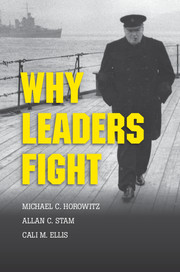Book contents
- Frontmatter
- Contents
- List of Figures
- List of Photographs
- List of Tables
- Preface
- Introduction
- 1 How Leaders Matter
- 2 Systematically Evaluating Leader Risk
- 3 Leader Risk across Geography and Time
- 4 The Experiences That Matter I: Military/Rebel Status, Age, and Education
- 5 The Experiences That Matter II: Childhood, Family, and Gender
- 6 “L’état, c'est moi” – or Is It?
- Bibliography
- Index
Preface
Published online by Cambridge University Press: 05 October 2015
- Frontmatter
- Contents
- List of Figures
- List of Photographs
- List of Tables
- Preface
- Introduction
- 1 How Leaders Matter
- 2 Systematically Evaluating Leader Risk
- 3 Leader Risk across Geography and Time
- 4 The Experiences That Matter I: Military/Rebel Status, Age, and Education
- 5 The Experiences That Matter II: Childhood, Family, and Gender
- 6 “L’état, c'est moi” – or Is It?
- Bibliography
- Index
Summary
History is made by people. From wars to elections to political protests, the world revolves around the way that people decide to behave. In particular, world leaders – the people that run countries big and small around the world – play a large role in shaping the destinies of their countries. This will not be surprising to anyone in the United States or any other place that features public political campaigns. Every four years in the United States, the country becomes preoccupied not just with the policy ideas of potential candidates for the presidency, but with what we can learn about how they would govern from their prior experiences. Whether it is the church Obama attended, Mitt Romney's business experience, or the fact that there has not been a single unmarried president since the Grover Cleveland administration (and even he married in office), the American public, like democratic societies around the world, cares deeply about the personal and professional backgrounds of its political candidates.
This is a book about those world leaders and how their experiences before they enter office shape how they think about the world and the choices they end up making when in office. It presents the most complete dataset on leader experiences ever created, the Leader Experience and Attribute Descriptions (LEAD) dataset, which contains data on more than twenty leader attributes, from military service to childhood to marriage and children, for every world leader from 1875 to 2004.
We focus in particular on how the background experiences of leaders shape the choices they make about whether to lead their countries into wars and start military conflicts, or avoid conflict and focus on other issues. Our findings show that leader attributes play a significant role in shaping how countries behave in the military arena – a role similar to or even exceeding, at times, that played by the international system or domestic political institutions.
From the perspective of academic political science, which has mostly ignored the role of leaders in international politics over the last several decades, until a recent renaissance, our findings, and the data underlying these findings, will come as a surprise. They also provide support for exploring the role of leaders in greater depth.
- Type
- Chapter
- Information
- Why Leaders Fight , pp. xi - xiiPublisher: Cambridge University PressPrint publication year: 2015

